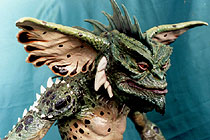|
|
|
|
Gremlins
|
 |
|
The premise of this film is perfect. The story begins when a small town teenager, Billy (Zach Galligan) receives from his parents a cute, furry little animal known as a Mogwai, but quickly rechristened as Gizmo. The gift comes with three ironclad rules: do not expose it to bright light, get it wet or feed it after midnight. But, of course all these infringements happen, and once they do Gizmo immaculately conceives a swarm of degraded Mogwai – Gremlins led by the vicious Stripe, bent on excess and destruction. This split between good and evil is pleasingly mirrored behind the camera, too. Producer Steven Spielberg angles the project towards an E.T.-style parable of responsibility, maturity and family bonds. But director Joe Dante is, artistically speaking, an eternal adolescent raised on Mad comics, Warner Brothers cartoons and Jerry Lewis movies. For him, the core of Gremlins is a superb set-piece in which Billy's mother (Polly Holliday) battles the gremlins-gone-amok, using every gory kitchen utensil at her disposal: food processor, carving knife and microwave. The Spielbergian happy family becomes, with just a little nudge into black comedy, a true horror story. The film labours a little too hard to make the over-arching but essentially meaningless connection between the prolific, dodgy inventions churned out by Rand (Hoyt Axton), the well-intentioned father of the family, with the bad Mogwai creatures as an exaggerated form of the everyday gremlins that infect domestic technology – hence the rather nonsensical name of Gizmo for a pet. One might detect again here the dead hand of craftsman Spielberg, always keen to cohere a film mechanically around a central but frequently empty motif: running in Catch Me If You Can (2002), waiting in The Terminal (2004). In fact, Dante shines as a filmmaker and storyteller whenever he can flee this tame, bland, reassuring concept and indulge in metaphoric delirium. For him, these proliferating little monsters can signify anything and everything: beatniks, neo-fascists, naughty teenagers, African-Americans, even (in a magnificent scene) the gullible mass audience hypnotised by the cinema spectacle of Disney's Snow White and the Seven Dwarfs (1937). As Jonathan Rosenbaum has remarked, this is the postmodern, anything-goes side of Dantean cinema. Gremlins was a highpoint of '80s pop culture – at least, I recall applauding it as such at the time – but not everything in it has dated well. Some moments of broad humour show the limits of Dante's cartoonish style, and the traces of Spielbergian sentimentality look ickier than ever. More generally, it is a little sad to see how few of the participants in this movie went on to bigger things: actors including Galligan, Phoebe Cates and Corey Feldman have virtually disappeared from the big screen, writer Chris Columbus squandered his early promise in garbage like Mrs Doubtfire (1993), and even Dante himself has struggled to maintain his unique personality within the Hollywood machine. Nonetheless, Gremlins did give birth to a magnificent sequel that is, on many levels, even more extreme and subversive than the original, giving full rein to Dante's gifts: Gremlins 2: The New Batch (1990). MORE Dante: Looney Tunes: Back in Action, Matinee, Innerspace, Explorers © Adrian Martin November 2004 |
![]()